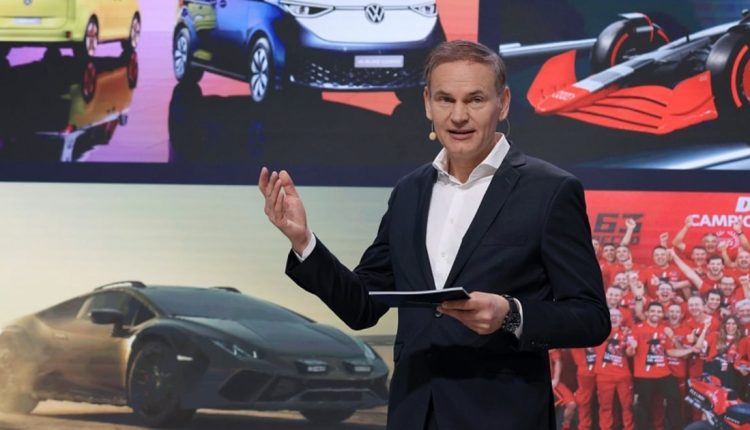BERLIN — Volkswagen Group said it will invest 180 billion euros ($193 billion) in the next five years into areas including battery cell production, digitalization in China and expanding its presence in North America, while spending on combustion engines will decline.
More than two-thirds of the five-year investment budget — 122 billion euros — is allocated toward EVs and software as the group, whose brands include Porsche, Audi, Bentley, VW and Skoda, intensifies a push to challenge Tesla’s leadership on EVs.
“We have set clear and ambitious targets and took necessary decisions to streamline processes,” CEO Oliver Blume said during the automaker’s annual press conference on Tuesday. This year “will be a decisive year for executing strategic goals and accelerating progress across the group,” Blume said.
The automaker is increasing overall spending by 13 percent compared with its last annual update.
The difference from the previous plan is primarily down to more investment in its battery business, raw materials, and a $2 billion plant in South Carolina for its Scout brand, CFO Arno Antlitz said.
“We expect to reach 20 percent electromobility in new sales from 2025 and are already investing two-thirds in that area,” Antlitz said. “On the other hand we need to keep combustion engines competitive… that is a double burden.”
VW’s investment in ICE technology will peak in 2025 when tough new Euro 7 emissions regulations in the European Union come into force and decline from then on, as it works toward its target of 50 percent all-electric sales globally by 2030.
VW said it is finalizing high-performance software for its premium and luxury brands which could in the medium-term be applied across the company, in an attempt to improve operations at its software unit Cariad.
The unit has gone over budget and fallen behind on its goals, suffering an operating loss of 2 billion euros in 2022 on revenue of 800 million euros, according to the carmaker’s annual report released on Tuesday.
VW is also investing in China, its biggest market, to improve competitiveness with local models to help stop a slide in market share, particularly among EVs.
The “substantial” investments in VW’s battery business and spending on combustion engines to keep up with emissions regulations “will present a key worry for investors” concerned about drag on cash flow, Bernstein analyst Daniel Roeska said in a note.


